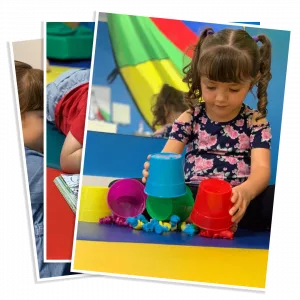Early Intervention
Every child develops at their own pace—while some may begin walking and talking on time, others may experience delays in speech, motor, or cognitive skills. If you have concerns about your child’s development, early intervention is key to achieving the best possible outcomes. Seeking support from speech-language pathologists (SLPs) and occupational therapists (OTs) can help your child strengthen essential skills for daily life, learning, and communication.
Our specialized therapy services focus on developing:
✔ Cognitive skills – Thinking, learning, and problem-solving abilities
✔ Communication skills – Gesturing, speaking, listening, and understanding language
✔ Physical and sensory skills – Crawling, walking, climbing, vision, and hearing
✔ Social-emotional skills – Playing, recognizing emotions, and building friendships
✔ Adaptive/self-help skills – Eating, bathing, dressing, and independent daily activities
If you’re noticing developmental delays, early support can make a significant difference in your child’s success.
Contact us today to learn how our expert therapists can help your child reach their full potential!

Early intervention is different for each child and family depending on your child’s needs and your family’s priorities. Early speech, language, and occupational intervention can help children be more successful with reading, writing, schoolwork, and interpersonal relationships.
A lot happens developmentally in the first few years of life and the most important step is to START EARLY!
(Source: ASHA Research)
For a brief summary on developmental milestones for ages birth through 5 years, please review our Developmental Milestones.
For information on how to get started with a free 10-15 minute screening or to begin the process in receiving an evaluation and therapy services, please contact us at (786) 717-5649.
If you’re interested in additional ways to help support your child’s development, we encourage you to review our Specialized Programs which include our Exceptional Camp.

Did you know?
- Approximately 19 percent of children between the ages of two and seven demonstrate a language delay.
- The prevalence of speech sound disorders in young children is 8-9%. By the first grade, roughly 5% of children have noticeable speech disorders; the majority of these speech disorders have no known cause.
- It is estimated that more than 3 million Americans stutter.
- It is estimated that approximately 80,000 individuals acquire aphasia each year.
- Incidence of childhood stuttering is highest between a child’s second and fourth birthdays, ultimately affecting 4% to 5% of the population.
- Case histories often reveal a positive family history of communication disorders. Between 28% and 60% of children with a speech and language deficit have a sibling and/or parent who is also affected.
Source: ASHA Research
Play Skills
Play is essential for a child’s overall development, fostering creativity, imagination, dexterity, and cognitive and emotional growth. It plays a crucial role in healthy brain development, laying the foundation for essential life skills. Engaging in age-appropriate play encourages language and motor development, while also promoting social interaction and engagement with the world. Through play, children explore their surroundings, build connections, and develop the skills needed to communicate, problem-solve, and navigate their environment. From an early age, play serves as a natural and fundamental way for children to learn, grow, and thrive.
Onlooker Play
Age
Any
Definition
Children watching others during play and may be reluctant to join or may not know how to play
Example
2 children are playing on a slide, while a 3rd child is standing by watching them
Solitary Play
Age
>2 years old
Definition
Children playing by themselves without interactions with other children
Example
A child playing on their own sorting and stacking nesting cups
Parallel Play
Age
2-3 years old
Definition
Children playing alongside each other, in similar activities, without obvious communication or interaction
Example
2 or more children playing with blocks near each other but not talking with each other
Associative Play
Age
3.5-4.5 years old
Definition
Children participating in similar or identical activities without formal organization or a definite goal
Example
2 or more children playing with blocks building the same thing, talking with each other but not working together to create something
Cooperative Play
Age
4-5 years old
Definition
Solving a problem by working together to achieve a common goal
Example
2 or more children are playing with blocks building the same thing
If you’re in doubt about whether your child is or is not meeting their developmental milestones or age-appropriate play skills, ask us for a free 10-15 minute speech and occupational screening or ask us about the evaluation process for our speech and occupational therapy services.
Onlooker Play
Age
Any
Definition
Children watching others during play and may be reluctant to join or may not know how to play
Example
2 children are playing on a slide, while a 3rd child is standing by watching them
Solitary Play
Age
> 2 years old
Definition
Children playing by themselves without interactions with other children
Example
A child playing on their own sorting and stacking nesting cups
Parallel Play
Age
2-3 years old
Definition
Children playing alongside each other, in similar activities, without obvious communication or interaction
Example
2 or more children playing with blocks near each other but not talking with each other
Associative Play
Age
3.5-4.5 years old
Definition
Children participating in similar or identical activities without formal organization or a definite goal
Example
2 or more children playing with blocks building the same thing, talking with each other but not working together to create something
Cooperative Play
Age
4-5 years old
Definition
Solving a problem by working together to achieve a common goal
Example
2 or more children are playing with blocks building the same thing
If you’re in doubt about whether your child is or is not meeting their developmental milestones or age-appropriate play skills, ask us for a free 10-15 minute speech and occupational screening or ask us about the evaluation process for our speech and occupational therapy services.
Contact Us
If you have any questions about speech therapy in Miami or Doral, Florida or would like to book an appointment for speech therapy, please call Exceptional Speech Therapy at 786.717.5649 or fill out the form below.
Does My Child Need Speech Therapy or Will They Grow Out of It?
Does My Child Need Speech Therapy or Will They Grow Out of It? Many parents notice small speech or language differences in their child and hope the issue will resolve on its own. It’s common for families to delay reaching [...]
Speech Therapy Near Me en Miami-Dade County: Apoyando a Niños y Familias Desde Doral, FL
Speech Therapy Near Me en Miami-Dade County: Apoyando a Niños y Familias Desde Doral, FL Cuando los padres comienzan a buscar en internet “speech therapy near me”, generalmente lo hacen porque tienen preocupaciones sobre el desarrollo del habla o lenguaje [...]
Speech Therapy Near Me in Miami-Dade County: Supporting Children and Families From Doral, FL
Speech Therapy Near Me in Miami-Dade County: Supporting Children and Families From Doral, FL When parents begin searching online for speech therapy near me, they are often looking for trusted, local care for their child. Whether concerns involve delayed speech, [...]


